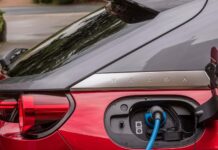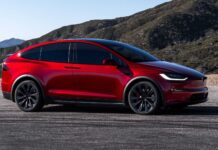[ad_1]
As part of President Biden’s Build Back Better (BBB) legislation, which still has to pass the Senate, US EV buyers may get a refundable tax credit of up to $12,500 when they purchase a new EV. However, $4,500 is earmarked for EVs built in the US by unionized automakers. That said, there is not a single currently available EV in the US that would qualify for the full credit.
Sure, the Chevrolet Bolt EV (and Bolt EUV) will qualify, though these are the only current EVs built in the US by union workers. and there’s one massive caveat. Due to battery fires, the Bolt EV and Bolt EUV are not currently for sale, as GM isn’t even producing them at this time.
What about the Ford Mustang Mach-E? Ford is an American automaker that relies on union workers, but it produces the Mach-E in Mexico, so it doesn’t qualify. Tesla‘s vehicles are built in the US, though the electric automaker isn’t unionized.
GM is planning an onslaught of EVs, so it seems the Biden Administration is banking on the future, putting all of its eggs in one basket, and counting on Mary Barra to come through. The all-new GMC Hummer EV is coming to market very soon, so perhaps people are hoping to get the full credit on the hulking electric pickup truck. However, it’s too expensive, so it doesn’t qualify. On the flip side, GM’s upcoming Cadillac Lyriq SUV should qualify based on the latest language.
Until the Ford F-150 Lightning comes to market, buyers really won’t have any option to take advantage of the full credit. The Lightning will benefit from the credit in a very big way, with the base model costing just $28,000 after the credit.
Eventually, the Bolt EV and EUV will resume production and sales. However, even with a $12,500 credit, it would be a big surprise if car shoppers started flocking to Chevy dealers to buy an EV that’s been recalled multiple times, and that they’ve seen on fire in the news for over a year now. Perhaps GM can regain trust and promote the heck out of the Bolt, though it may come as a surprise to many folks if that’s how it actually plays out.
Keep in mind, since the BBB legislation hasn’t passed the Senate, and changes will likely be made, we don’t yet know for sure how all of this is going to play out. If the Senate simply removes the part about unions, the problem is mostly solved. It could also choose to raise or lower the starting price requirements, but there’s always the case against subsidizing expensive products for wealthy buyers.
Did we miss any other EVs built in the US by union workers? What about other upcoming electric cars? This topic deserves plenty of conversation. Scroll down and engage.
[ad_2]
Source link














